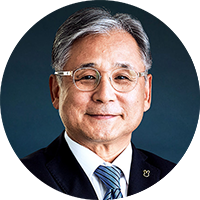Coach's VIEW is a business column authored by executive coaches in COACH A, aimed at providing valuable insights and effective approaches for leveraging coaching to foster organizational and leadership development. The column draws on the latest coaching trends and data, as well as insights from notable global publications on coaching.
Questions Create New Meanings

September 21, 2021

When trying to understand the current state of a business organization, people tend to observe the organization as a fixed state at a certain point in time. However, organizations are always changing. The state that we observe at one point in time may not be the same as the one at another point in time.
The same way applies when facing the problem that occurs within the company. We all try to separate ourselves from the problem and look at it from the outside. However, you are part of the organization with the problem. If you place yourself outside of the organization, you perceive the organization as something apart from you.
A company is not a mechanical system, but consists of groups of people. Therefore, we cannot observe it by opening the hood of a stationary car and observing the engine and battery, just like looking at the machine from the outside.
This rule also applies to the relationship between a coach and a client.
You Are Part of the Relationship
When two people are facing each other in coaching, they are in the relationship where both of them observe each other objectively. Both of them are part of that relationship. When a coach asks a question to a client, the coach sometimes expects the client for an answer, and even a "right" answer for the coach.
The purpose of questioning in coaching is not to get the right answer out of the client, but to create a new meaning and understanding throughout the process. That process is not a linear, but an exploratory one. The questions are seeking a process of changing perspectives, changing time frames, and exploring various ideas for a client.
The Answer Does Not Have To Be Just One
Sometimes coaches ask questions to clients with their own right answers in mind. It means that coaches sometimes ask questions based on their own unconscious judgments of right or wrong, or on their own beliefs of what a person should be.
If a coach has the belief "Active listening is a skill that a superior should have", he or she might ask the client,
"How much do you listen to your subordinates?"
"How much do your subordinates talk to you or how much do you talk to them?
based on the right answer to the question, "Superiors should listen to their subordinates. Therefore, they should master that listening skill".
The coach might utilize the question to guide the client to the "right" answer.
Nevertheless, what effect does active listening bring in improving company performance? I have not seen any evidence that active listening improved strained relationships between superiors and subordinates, or contributed to better business performance.
It does not mean that active listening is useless. I believe that it is beneficial for both subordinates and the organization when superiors who are disinclined to listen to their subordinates, start to listen more attentively.
However, I would say that active listening is not the only way to improve subordinates' productivity, company performance, and resolve strained relationships and problems. Problems are much more complex than that. A question that was aimed to seek a "right" answer or to check it right or wrong is not a question in coaching.
What Assumptions Do I Have?
Humans are not parts of an interchangeable system as each one of us is unique. We are also purpose-oriented, active beings who can change ourselves and the environment around us. Coaching is based on this concept, and the questions created by coaches are also based on this concept. One of the purposes for a coach asking questions to the client is to create an opportunity for the client to question his or her own assumptions and interpretations of things.
Having said that, the coach should step back and create a space for the client to reflect on themselves. When a coach asks questions for a client, the coach should ask the same question to himself or herself.
"Who is the question for?"
"What is the purpose of the question?"
"What is the purpose of asking the question?"
Questions are not directed from the coach to the client, but placed between the client and the coach. There is no single right answer required.
Coaching the Creation of Questions
Questions allow us to look at our own actions and behaviors in a different perspective.
Think through a single question.
Try out new ideas and interpretations.
Explore new options.
"What do I need to know?"
"What do I need to prepare?"
"What are we dealing with?
"What are the next steps?"
"What decisions will I make?
"Which information is influencing me?"
Even a single question can lead to a variety of interrelated questions.
From a single question thrown by the coach, the client can create a series of questions for themselves. Coaching this process is the real role of the coach.
The coach does not ask all the questions, but activates the client to start creating questions by themselves. In other words, questions are a stimulus to create new meanings, and the purpose of coaching is to enable the client to practice this process of creation.
The other day, I had an opportunity to interview an American client receiving coaching by COACH A.
What impressed me was when this client told me,
"I noticed that I could still change."
*Regardless of profit, non-profit or intranet, secondary use such as copying, diversion, selling etc. is prohibited without permission.
Language: Japanese
